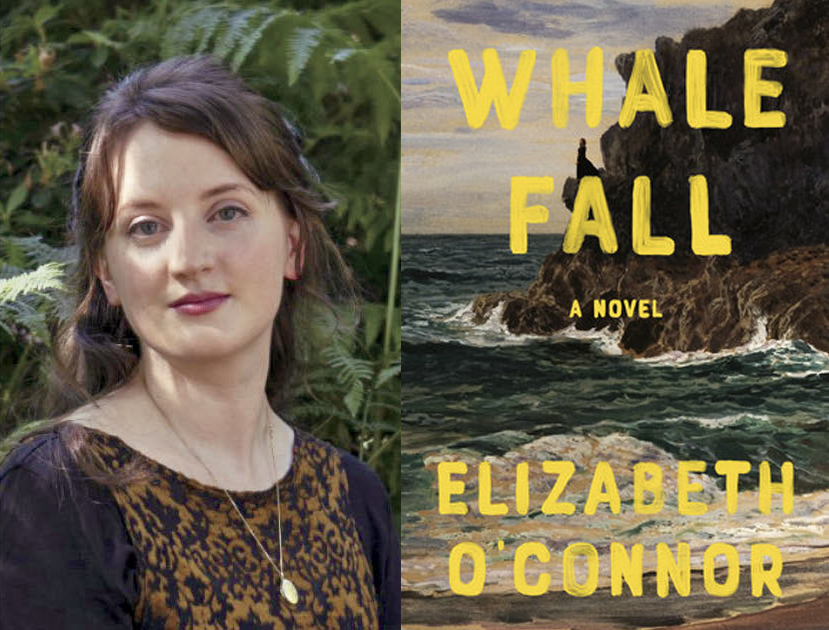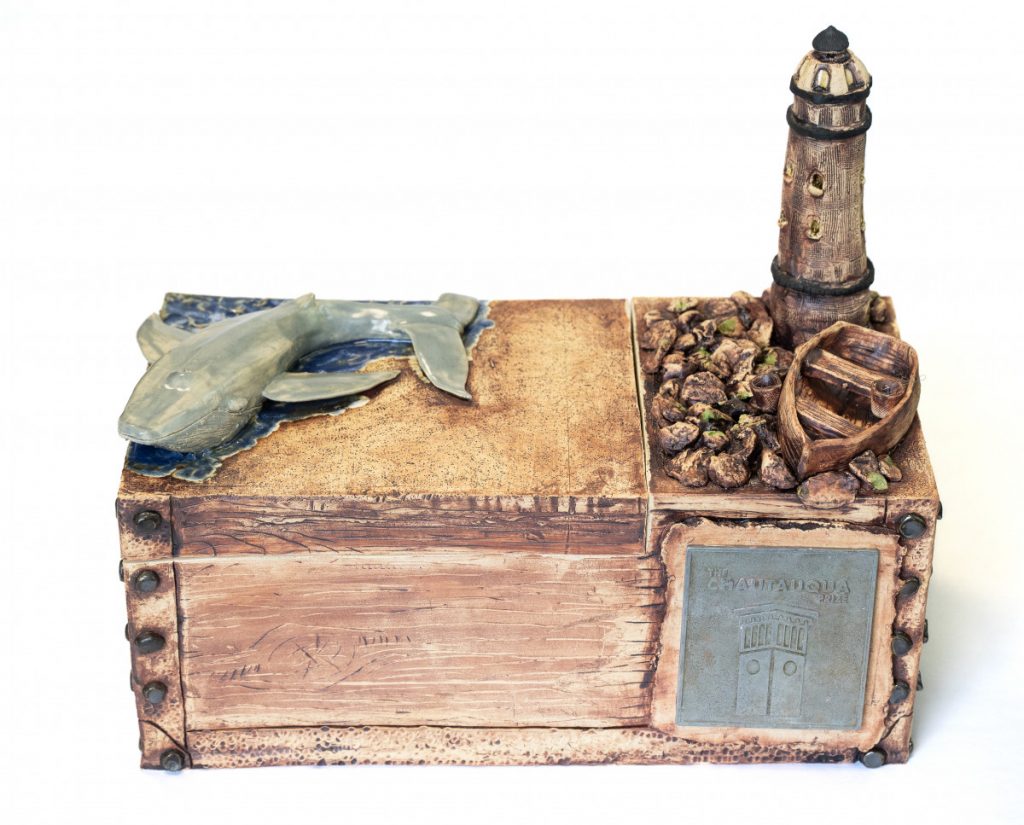
Susie Anderson
Staff Writer
Although Elizabeth O’Connor is tempted to use the stipend from the 2025 Chautauqua Prize to buy a new dog, she has other plans. Instead, she will use the $7,500 award to research her sophomore novel, which fittingly, is all about dogs.
“I am writing about Crufts, a dog show in Birmingham, and I’ve been thinking about a very domesticated version of nature, how we live with it and animal-human relationships,” O’Connor said. “I have been doing a lot of archival work, so the funds will definitely help me with that.”
Sifting through archives is no new feat for the author, as her debut book, Whale Fall: A Novel, involved research into the folklore of coastal communities in the United Kingdom to transport readers to a fictional island off the coast of Wales during the interwar period.
O’Connor, the author of The Chautauqua Prize-winning Whale Fall, will be presented with the prize in a special event at 3:30 pm today in the Hall of Philosophy.
O’Connor’s debut novel was selected from a record 394 entries — read and whittled down by 118 volunteer Chautauquans who are writers, educators, publicists and avid readers — to win the 13th Prize. The annual, national prize celebrates a book of fiction or literary/narrative nonfiction — or, new this year, poetry — that provides a richly rewarding reading experience and honors the author for a significant contribution to the literary arts.
The long list became a short list, and eventually seven finalists emerged this spring: Whale Fall; We’re Alone: Essays, by Edwidge Danticat; No Road Leading Back: An Improbable Escape from the Nazis and the Tangled Way We Tell the Story of the Holocaust, by Chris Heath; By the Fire We Carry: The Generations-Long Fight for Justice on Native Land, by Rebecca Nagle; The Fertile Earth: A Novel, by Ruthvika Rao; The Light Eaters: How the Unseen World of Plant Intelligence Offers a New Understanding of Life on Earth, by Zoë Schlanger; and Load in Nine Times: Poems, by Frank X Walker.
These finalists — and Whale Fall as the eventual winner — were judged and selected by the Prize’s jury: Kwame Alexander, the Michael I. Rudell Artistic Director of Literary Arts; Stephine Hunt, manager director of literary arts; Jordan Steves, Emily and Richard Smucker Chair for Education; Sara Toth, editor of The Chautauquan Daily; and Emily Carpenter, Prize administrator and Department of Education coordinator. This year’s guest judges rounded out the jury — award-winning author Andrew Krivák (himself the author of the first book to ever win The Chautauqua Prize) and renowned literary scholar Gena E. Chandler.
For Hunt, the Prize reflects a community of readers voting on their best reading experience of the year. Narrowing the books down to the finalists, each story introduced a new conversation starter.
“Something we are looking for in a Prize winner or finalist is a book that can sit in the center of different conversations with different readers,” Hunt said.

Whale Fall fit the bill. In a sparse and captivating prose, O’Connor presents a bildungsroman set in a seafaring town with a dwindling population before the outbreak of World War II. The introduction of two anthropologists to the island complicates the life of 18-year-old Manod and represents an encroaching mainland and uncertain future.
While the story blossomed from academic interests sparked from her Ph.D. at the University of Birmingham, O’Connor quickly drew familial ties to the coastal towns of the United Kingdom while writing.
“My grandmother was from North Wales and my grandfather from the west of Ireland,” she said. “… I started thinking and reflecting a bit more on what it would have been like for them to grow up in these communities that had lived with the sea or worked with the sea.”
With the setting generated from an amalgam of coastal histories, O’Connor emphasized that the novel would not exist without the whale at its core. She found inspiration for the novel’s title at a historical lecture that explored how communities in Nova Scotia were transformed by the beaching of whales.
“There were examples of whales being incorporated into town crests or murals of whales being painted in the town,” O’Connor said. “It was really interesting how a natural phenomenon can change the human culture of a place.”
Part of what made the reading experience so compelling for Hunt was the presentation of language in different forms.
“It is not only a fascinating take on storytelling technique and a reimagining of how language and Welsh can be used, but also reads beautifully both on the page and in the audiobook,” Hunt said.
After reading, listening to and subsequently reading while listening to Whale Fall, Hunt said the selection was a clear favorite. For O’Connor, navigating English and Welsh throughout the story reflected a tension of the main character, Manod.
“Language in the novel because it is quite a powerful manifestation of how Manod is caught in two versions of herself — one who stays on the island with her family and culture and one who leaves,” O’Connor said.
When encountering two anthropologists, Manod considers her place on the island and elsewhere. As an outsider looking into the cultures of coastal towns in crafting her fictional island, O’Connor was conscious of not slipping into the exploitative, anthropological role she wrote about.
“I felt a real responsibility to be very careful about how I was portraying them and hoping I was not romanticizing them in the same way as these anthropologists did,” O’Connor said.
On Thursday evening, the Literary Arts Center at Alumni Hall welcomed Chautauquans and O’Connor to preview the physical prize in advance of the ceremony today. The reception featured the prize itself, designed by sculptor Raoul Pacheco. Today, O’Connor will address Chautauquans from the podium of the Hall of Philosophy with her book reflecting on the interconnectedness of the natural world and human stories.
“I think humans — as storytelling creatures — take the landscape around them and turn it into emblems of things or symbols and incorporate them into their arts, their crafts and the stories they tell,” O’Connor said.




